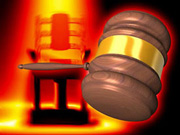
The Supreme Court will now examine whether a fatal three-drug cocktail most of the states use to execute inmates may violate the ban on cruel and unusual punishment.
Among the four key questions the justices will consider is whether states can execute an inmate if there is a "substantial risk" of pain and suffering through lethal injection.
By taking the Kentucky case, the justices are expected to provide a road map for judges across the country, including in California, where a San Jose federal judge has been reviewing the issue for more than a year.
"They decided to take the bull by the horns," said Ronald Matthias, a senior assistant attorney general in charge of California's death penalty appeals. "It is a very significant development, and we expect a very far-reaching and important decision which we'll obviously be bound by."
The Supreme Court review is likely to further delay California's effort to resume executing death row inmates.
Matthias would not speculate whether the court's intervention would halt the ongoing challenge in California by death row inmate Michael Morales, whose case has prompted Gov. Arnold Schwarzenegger to overhaul the state's lethal injection procedures.
U.S. District Judge Jeremy Fogel is scheduled to hold additional hearings on the Morales case in December and to tour a newly constructed death chamber in November. But some legal experts now expect the case may wait until the Supreme Court makes its ruling.
California has put executions on hold since early 2006 while Fogel has been reviewing Morales' lawsuit, which maintains the state's lethal injection method poses an undue risk of an inhumane execution for the more than 650 inmates on the state's death row.
John Grele, one of Morales' lawyers, said he would need to review the Kentucky case more closely to determine its effect on the California litigation.
But legal experts agreed the decision to hear the Kentucky case would have broad implications for states across the country, particularly given the scattershot results that have come from different courts asked to review the arguments of death row inmates.
In some states, executions have been put on hold, whereas other states have kept executing people despite nearly identical challenges pending in their courts.
The Supreme Court's decision to take the Kentucky case is "huge news" that should lead to a "de facto moratorium" on executions nationwide, Douglas Berman, an Ohio State University law professor and leading expert on the issue, said on his law blog. Berman does not expect a ruling until the end of the court's next term, in June.
Elisabeth Semel, head of the death penalty clinic at UC Berkeley's Boalt Hall School of Law, said the case is crucial to settling questions surrounding lethal injection but cautioned that the justices do not necessarily have to settle them all.
"The court is taking a bite of the apple," she said. "But how big a bite is not known."
"It puts Judge Fogel and other judges in the middle of this process in a position where they have to step back," she added.
A Supreme Court review of lethal injection has been brewing for years. Most states with a death penalty have turned to the method after similar legal challenges of alternatives, such as the gas chamber and the electric chair.
A federal appeals court declared California's gas chamber unconstitutional in the mid-1990s, prompting the switch to lethal injection.
In recent years, the Supreme Court has been repeatedly asked to review challenges to various states' lethal injection procedures but has steered clear of the central constitutional issue. The justices did make it easier for condemned inmates to file challenges, prompting a number of cases to unfold in states such as Missouri, Tennessee and Kentucky.
A federal judge in Tennessee recently put executions on hold there after concluding that the state's lethal injection method was too flawed. Fogel, in the California case, called this state's execution procedures "broken" but fixable.
In the Kentucky case, the state courts rejected challenges from death row inmates Ralph Baze and Clyde Bowling Jr. after a trial was held in 2005 to review Kentucky's execution method. It was the Baze and Bowling case the Supreme Court agreed Tuesday to hear.
Kentucky uses the same three drugs to put an inmate to death as California -- sodium thiopental to sedate the inmate, pancurium bromide to paralyze the muscles in breathing and potassium chloride, which stops the heart.
Lawyers for death row inmates say pancurium bromide conceals an inmate's suffering and masks the potential of the third drug, causing a searingly painful death.
One of the four issues the Supreme Court may address is whether it is unconstitutional to use those three drugs if other chemicals are available that pose "less risk of pain and suffering."
But legal experts say the court's ultimate ruling may focus more on how a state administers those drugs, rather than what drugs are used.
The Supreme Court, experts say, can instead clarify the standard for what amounts to a cruel and unusual execution and the obligations of states to administer the fatal drugs with proper safeguards.









